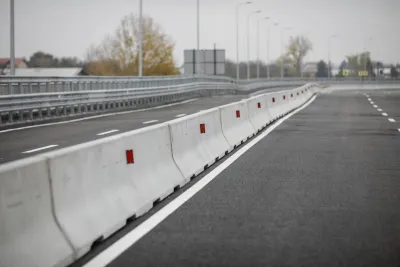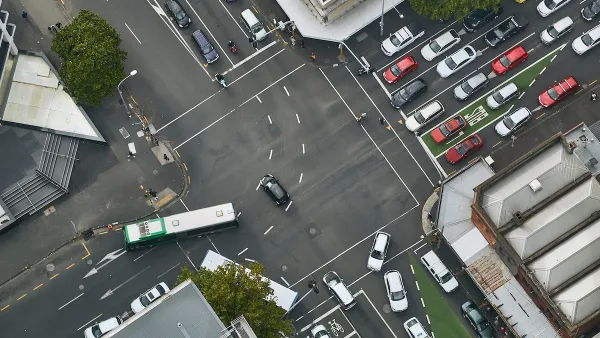The recycled rubber barrier can protect pedestrians and people in cars on lower-speed streets.

A new type of roadway barrier known as the Colorado barrier — a nod to the concrete Jersey barrier — was approved for use on roadways with speed limits of up to 44 miles per hour, reports Ben Thorpe in Equipment World.
The barrier is made of recycled tires. “Manufacturing an 8-foot Colorado Rubber Barrier uses 100 tires, meaning a mile’s worth of barriers uses 65,000 tires. Over 1.8 billion tires end up in landfills or are burned each year, of which 300 million are in the U.S.”
According to the company that independently tested the barrier, the barrier meets the goal of providing “a forgiving roadway and roadside that reduces the risk of a serious crash when a motorist leaves the roadway, as well as towards bystander motorists and pedestrians.” The barriers could reduce damage to vehicles by absorbing more energy, and are lighter and easier to relocate.
FULL STORY: The "Colorado Barrier" Becomes First Rubber Barrier Approved for U.S. Roads

Planetizen Federal Action Tracker
A weekly monitor of how Trump’s orders and actions are impacting planners and planning in America.

Restaurant Patios Were a Pandemic Win — Why Were They so Hard to Keep?
Social distancing requirements and changes in travel patterns prompted cities to pilot new uses for street and sidewalk space. Then it got complicated.

Map: Where Senate Republicans Want to Sell Your Public Lands
For public land advocates, the Senate Republicans’ proposal to sell millions of acres of public land in the West is “the biggest fight of their careers.”

Maui's Vacation Rental Debate Turns Ugly
Verbal attacks, misinformation campaigns and fistfights plague a high-stakes debate to convert thousands of vacation rentals into long-term housing.

San Francisco Suspends Traffic Calming Amidst Record Deaths
Citing “a challenging fiscal landscape,” the city will cease the program on the heels of 42 traffic deaths, including 24 pedestrians.

California Homeless Arrests, Citations Spike After Ruling
An investigation reveals that anti-homeless actions increased up to 500% after Grants Pass v. Johnson — even in cities claiming no policy change.
Urban Design for Planners 1: Software Tools
This six-course series explores essential urban design concepts using open source software and equips planners with the tools they need to participate fully in the urban design process.
Planning for Universal Design
Learn the tools for implementing Universal Design in planning regulations.
Heyer Gruel & Associates PA
JM Goldson LLC
Custer County Colorado
City of Camden Redevelopment Agency
City of Astoria
Transportation Research & Education Center (TREC) at Portland State University
Camden Redevelopment Agency
City of Claremont
Municipality of Princeton (NJ)





























